|
This section contains 771 words (approx. 2 pages at 400 words per page) |

|
Chapter V (492-502) Summary and Analysis
According to Callicles, anything that limits freedom limits the enjoyment of life and leads to subjugation through language, law, and censorship. He regards the truth to be luxury. As conventions are made by men, they are against nature.
Socrates considers such views as spontaneous. Those who are weak lack conviction and memory and thus can lose everything. He therefore considers order as being happier than the lack of restrain. Callicles views being content as lacking desires and not wanting pleasures. Satisfaction leads to indifference.
Simply satisfying desires can lead to happiness, but pleasures differ from good as good and evil fortunes differ and what is pleasant must differ from what is good. Socrates proves that bad differs from pain in the same way that what is good needs not necessarily be pleasant. Those that are good have...
(read more from the Chapter V (492-502) Summary)
|
This section contains 771 words (approx. 2 pages at 400 words per page) |

|




